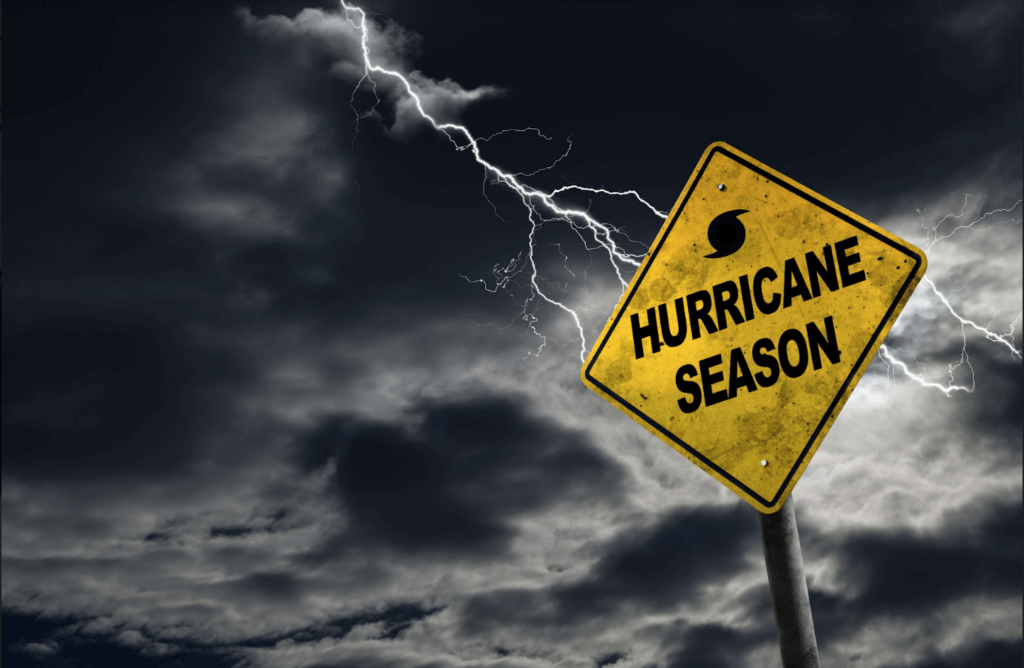
Expansive tropical cyclones or hurricanes can be incredibly devastating to both people and property. These destructive storms can cause massive amounts of wind damage, flooding, and even tornadoes after they make landfall. In the aftermath of a hurricane, many property owners will turn to their insurance companies to seek relief for any damage sustained. Policyholders might be surprised to find that insurance for a hurricane is not entirely straightforward, leaving them to ask, how does hurricane insurance work?
Understanding Hurricane Insurance
When it comes to hurricane insurance, it’s important policyholders understand that there is no such thing as a true hurricane insurance policy. Rather, hurricanes are insured by purchasing multiple policies that offer various forms of protection for wind and flood damage. While certain types of property damage caused by a storm are covered under a standard property insurance policy, this isn’t true in all cases. For example, while some commercial policies may offer protections for wind damage, others may not, depending on where the property is located. If this is the case, a separate policy should be purchased.
Commercial property owners who operate their businesses in hurricane-prone areas like Texas should have the right kinds of policies on hand to ensure they are well equipped to fully recover from the next major storm. The policies needed to ensure proper hurricane insurance coverage include:
Windstorm Coverage
In most parts of the country, coverage for hail and windstorm damage is included in a standard commercial property insurance policy. However, in hurricane-prone states like Texas, Louisiana, and Florida, commercial policies may exclude windstorm damage. Therefore, if you live in a coastal community you should purchase a windstorm policy in addition to property insurance if it is not already included. With windstorm coverage in place, all wind damage would be covered, including damage related to tornadoes, hail, and high-speed winds.
Windstorm coverage can be purchased on the private market. However, if you are unable to get coverage some states have programs you may purchase coverage from. For example, the Texas Windstorm Insurance Association (TWIA) provides wind and hail coverage for 14 counties along the Gulf Coast. However, depending on where the property is located within the state, the owner may need to already have acquired flood insurance before being able to obtain windstorm coverage.
Water and Flood Coverage
Flood insurance protects residential and commercial properties from flood-related damage. This type of coverage protects both the physical location as well as its contents. While, property owners can obtain this coverage through the federal government’s National Flood Insurance Program (NFIP), which is managed by the Federal Emergency Management Agency (FEMA), flood insurance can also be purchased on the private market.
A common misconception many policyholders have is that having property insurance in place means they are covered for flood damage. This is not the case, as many Texas homeowners and business owners found out after Hurricane Harvey due in large part to many of the flooded areas being located outside of designated floodplains.
While certain areas may not be at constant risk of flooding, floods are often the most common and expensive natural disasters. In fact, according to The Hartford, over 20% of flood claims involve properties outside of high-risk flood zones. Hurricanes and strong storms are not the only sources of flood damage either. In areas that are prone to wildfires, the landscape and ground conditions often change, making it easy for heavy rains to cause flash flooding. Broken dams, levees, and new building developments that alter the flow of water can also trigger a flood.
Hurricane Insurance Deductibles
Insurance deductibles refer to the amount subtracted from the insurance company’s claim payout – or the initial amount of the loss the policyholder must bear before coverage kicks in. While hurricane deductibles are similar to standard property deductibles, they also have distinct differences. The three most common hurricane insurance deductibles are:
- Windstorm Deductibles: Also referred to as a wind/hail deductible, these insurance deductibles apply to damage sustained not just from a hurricane, but also from tornadoes, hail, and other strong wind systems.
- Named Storm Deductibles: Named storm deductibles typically go into effect when the National Weather Service (NWS) or the National Hurricane Center (NHC) names a storm and that storm subsequently damages a structure, meaning a tornado and other strong windstorms would not trigger this type of deductible
- Hurricane Deductibles: A hurricane deductible is triggered only in the event a storm has strong enough winds to be categorized as a hurricane and does not apply to tropical storms or depressions.
Hurricane deductibles usually range from one to five percent of a property’s insured value; however, they can be higher in high-risk areas. The most foolproof way to know the amount of your hurricane deductible is to thoroughly review all the insurance policies that apply to your property. If a hurricane deductible applies, it can be calculated as a flat dollar amount or as a percentage of the coverage. Depending on the policies in place for a given property, a deductible may only apply once per hurricane season. In order to truly assess the coverage options available for hurricane damage, property owners should consult legal counsel.
Hurricane Insurance Coverage Attorneys
Property damage caused by a hurricane can throttle operations and leave business owners without the means to make ends meet for a prolonged period of time. While having the right policies in place for a hurricane is essential, ensuring the property has adequate coverage can be an arduous process.
At Raizner Law, our insurance coverage attorneys are well versed in deciphering policy language and are familiar with the various tactics insurers utilize to avoid paying out on valid claims. If you are in need of assistance with a hurricane-related claim, we can help. Contact us today.


